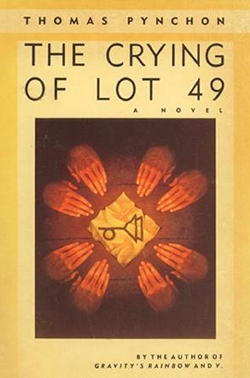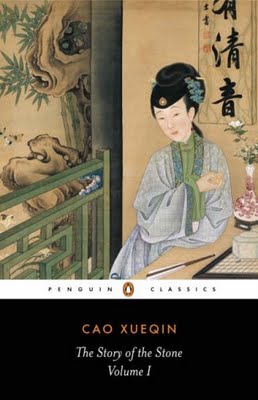 I guess I can now say that I finished a Pynchon’s novel… Or not quite:
I guess I can now say that I finished a Pynchon’s novel… Or not quite:
Certainly this is the ambiance that permeates Pynchon’s 1966 novel The Crying of Lot 49, that short strange book lodged between V (1963) and Gravity’s Rainbow (1973) in the oeuvre of this often prolix author. I suspect many readers tackle this brief novel—or in Pynchon’s enigmatic description, a work “marketed as a novel”—with the thought that something so compact, a mere 45,000 words, will make for an easy introduction to a sometimes elliptical writer. Ah, the joke is on them. A walk through a house of mirrors may be short when measured in steps, but if you keep on slamming your face into your own reflection, the effect is anything but that of a leisurely stroll.
Oh no, I’m not attempting to review this. I’ll stick to stuff I pretend to be more familiar with. But I wanted to put together some thoughts and quotes to better figure out where I stand.
I may have said here and there that Pynchon makes for an infuriating read. It has most of the “literary” pretentiousness and, so, esoterism of Wolfe. 99% of the cultural references that make the fabric of a Pynchon’s novel are completely lost on me (and something similar happens to me even with, say, Franzen). Even when I look them up and read about them they are lost too. Because Pynchon doesn’t simply reference a fact, but by referencing it he drags in the novel that “feel”. And if you aren’t a millenarian man-brain, that feel is not part of your experience; you can only feel the loss, and suck it up. The infuriating part is trying to bite thin air and never make any progress.
Another problem I had, I had it after turning the last page. This is a book that has David Forster Wallace written all over it: you see everything everywhere. Yes, it’s backwards, but it’s because I read DFW before Pynchon. The most obvious feat is the momentum building and building, the sense of impending doom/revelation, then you turn the page and the book is over before it reached the climax. Oh, so infuriating. Building a mystery without revealing it, for the whole breadth of the novel.
A couple of hours ago I was reading a review of Murakami’s 1Q84, with a fitting quote out of the book itself:
As a story, the work is put together in an exceptionally interesting way and it carries the reader along to the very end, but when it comes to the question of what is an air chrysalis, or who are the Little People, we are left in a pool of mysterious question marks. This may well be the author’s intention, but many readers are likely to this lack of clarification as a sign of ‘authorial laziness.’ (p. 380) This confuses Tengo. He knows that, as a story, Air Chrysalis was fascinating to many people […]. What more did it have to do? (p. 381)
I’m conflicted because this is what for me makes coincide my utter fascination for something not completely “settled” and solved, with my utmost RAGE (or despair) when it is not. Outright hostility to the writer for being deliberately obscure. For hiding meaning, or simply having fun baiting me out in the depth of the forest, and then leave me there without a clue or way out.
Coupled with simple self-doubt, not feeling secure of my own intelligence and ability to understand something. So the necessity of seeing it all spelled out in as many possible ways, pre-chewed and possibly even digested, as to clear all doubt, and then sighing of relief (and feel clever, for getting it).
Thankfully these days we have the internet, so I can at least go and match my own patterns with those out there to see how much of the Big Picture I miserably missed. At least to quench some superficial need of… certainty:
As in his earlier novel, V., Pynchon seems to be making a point about human beings’ need for certainty, and their need to invent conspiracy theories to fill the vacuum in places where there is no certainty.
These days I could put myself as Oedipa in the book without requiring almost any changes. My OWN paranoia. As if the whole world is conspiring and playing games around me. For example, on one hand this book brings heavily back the theme of “Entropy” used in that short story I randomly stumbled on. And Pynchon implicitly reinforces this connection, not just as a theme in common, but even a style.
One of the things I like the most is when a writer writes about his own work, giving his own opinion of it (maybe because of what I wrote above). Pynchon does this in the introduction he wrote for “Slow Learner”, the short story collection that includes “Entropy”. I’d recommend to read this introduction because it’s interesting for many, many reasons, but toward the end it also briefly examines “The Crying of Lot 49”: The next story I wrote was “The Crying of Lot 49”, in which I seem to have forgotten most of what I thought I’d learned up till then.
Since in the introduction Pynchon’s analyzes his own writing flaws, so supposedly those things he learned to improve, while also acknowledging that these flaws are kind of a constant in his work (“Most of what I dislike about my writing is present here in embryo, as well as in more advanced forms.”), then I see that remark about “Lot 49” as implicitly linked to the flaws he pointed out in “Entropy”:
The problem here is like the problem with “Entropy”: beginning with something abstract — a thermodynamic coinage or the data in a guidebook — and only then going on to try to develop plot and characters. This is simply, as we say in the profession, ass backwards. Without some grounding in human reality, you are apt to be left only with another apprentice exercise, which is what this uncomfortably resembles.
Of which I think there’s a trace in this book. Sometimes it feels like Pynchon “overwrites” Oedipa’s character. As if the reality of the fact is then coming truly alive only from the writing. An ordinary event made extraordinary by how it’s written. It’s Pynchon coming in, describing Oedipa and taking control of her stream of consciousness. In fact I wonder if I’m wrong if I say the book is effectively written in third person omniscient narrator EVEN IF it’s closely bound to Oedipa’s PoV. It’s almost never faithful to her awareness.
I identify with Oedipa’s paranoia because I’m doing outside the context of the book what Oedipa does within. Seeing patterns surface and wondering if their shape is a fantasy, or if there’s truly a lingering meaning. A kind of universal connection with a far reach. I’m reading the book and wondering if what I see into it is what the book is showing me. If the conspiracy I see is real or only my own fantasy that completes and compensates the missing parts. And in a Pynchon’s novel, where I feel I’m missing something every line, there’s plenty of compensation and filling that needs to be done.
This is how I interpret it, coming straight from a bias: the book does explain everything thoroughly, actually doing a rather meticulous work picking up and closing all the loops it opened (I wonder what others would say about the numerous “infodumps” toward the end). The climax and final revelation seem to fall off the edge only because everything was revealed a couple of pages back, so the ending is like an Epilogue where events and characters merely drift onward. The end is not shown not because the writer is cynically evil and torturing the reader, but as a hint that what follows is so irrelevant that it doesn’t need to be told. We don’t get to see what happens after not to heighten the mystery, but to heighten the truth. It’s the momentum that makes the reader carry on, eager to turn pages and find out how it ends. The missing part is necessary to redirect the attention to what’s relevant. The revelation isn’t one the reader has to make on his own, but one that needs to be properly located, turning the pages back. It needs to be re-ordered.
A problem I have with the book is that I wildly disagree with what’s written on the back cover:
“The highly original satire about Oedipa Maas, a woman who finds herself enmeshed in a worldwide conspiracy, meets some extremely interesting characters, and attains a not inconsiderable amount of self-knowledge.”
Self-knowledge? If anything she LOST it. She’s completely, utterly destroyed by the end of the book, as I see it. It’s pretty much the way Hal ends up in Infinite Jest. It’s quite hard for me to see it in an optimistic, positive light.
DFW essentially writes the deal about The Crying of Lot 49: “The truth will set you free. But not until it is finished with you.”
Going backwards here are some quotes to support my interpretation of the book and some of the patterns that seemed to be there:
Possibilities for paranoia become abundant. If Tristero has managed to maintain even partial secrecy, if Thurn and Taxis have no clear idea who their adversary is, or how far its influence extends, then many of them must come to believe in something very like the Scurvham-ite’s blind, automatic anti-God. Whatever it is, it has the power to murder their riders, send landslides thundering across their roads, by extension bring into being new local competition and presently even state postal monopolies; disintegrate their Empire. It is their time’s ghost, out to put the Thurn and Taxis ass in a sling.
But over the next century and a half the paranoia recedes, as they come to discover the secular Tristero. Power, omniscience, implacable malice, attributes of what they’d thought to be a historical principle, a Zeitgeist, are carried over to the now human enemy.
This is a description of paranoia. It is caused by what is essentially a lack of certainty, a kind of compensation. What is not understood acquires a mythical shape. A Zeitgeist, like the conspiracy theories coming out of 9/11. Growing uncertainty, growing insecurity, and so the scarcity of elements to explain what happened becomes a mythical structure where fears are projected. Only what is known can be traced, but it is too scarce, and so it comes together as a fantasy.
Now, I believe all this structure is repeated in the book on a much broader level. About entropy, about communication, and ultimately about language, the brain and the perception of consciousness (as with “entropy”, it becomes a cosmic theme). This is why it looks like paranoia to me, because it’s again all part of what I’m reading and writing on the blog these past few months. And while I was expecting this book to deal with conspiracy and other intriguing things, I didn’t expect it to go SO close to the true themes I’m looking into. I see this specifically as the key to unlock the mystery of the book at its most profound and connected level.
“Cherish it!” cried Hilarius, fiercely. “What else do any of you have? Hold it tightly by its little tentacle, don’t let the Freudians coax it away or the pharmacists poison it out of you. Whatever it is, hold it dear, for when you lose it you go over by that much to the others. You begin to cease to be.”
This seems to me a call to Hillman’s psychology. The need to not lose the symbol, stick to it. Hilarious reply comes to Oedipa’s request of “dissipating the mystery”. Of explaining everything as an illusion (“hoping you could talk me out of a fantasy“). Hilarious tells her essentially that this can’t be done. Also an answer to why the book can’t have its mystery revealed. Because it’s the closed loop itself the condition of existence. As if paranoia and self-consciousness coincided. The paradox can’t be explained because it would cause losing it. The revelation IS the paradox, and to understand it you need to keep it whole.
“And part of me must have really wanted to believe—like a child hearing, in perfect safety, a tale of horror—that the unconscious would be like any other room, once the light was let in. That the dark shapes would resolve only into toy horses and Biedermeyer furniture. That therapy could tame it after all, bring it into society with no fear of its someday reverting. I wanted to believe, despite everything my life had been. Can you imagine?”
I see again the interplay between two levels. Here specifically between consciousness and unconscious. One a more abstract level between the real and the imagined. It’s like the whole book is simply showing dualism in various shapes. There’s always a perceived level, and a possible hidden one:
Behind the hieroglyphic streets there would either be a transcendent meaning, or only the earth.
Always two sides:
The saint whose water can light lamps, the clairvoyant whose lapse in recall is the breath of God, the true paranoid for whom all is organized in spheres joyful or threatening about the central pulse of himself, the dreamer whose puns probe ancient fetid shafts and tunnels of truth all act in the same special relevance to the word, or whatever it is the word is there, buffering, to protect us from. The act of metaphor then was a thrust at truth and a lie, depending where you were: inside, safe, or outside, lost.
It seems to me all coming down to Cartesian dualism. Or, if you prefer, coming out of it in various shapes and forms. Oedipa’s struggle to make sense of patterns she sees is the same struggle of trying to grasp reality, and being always at loss. The need to escape the loop that makes our prison, but also our identity. Could a writer solve or reveal what’s beyond? Could the mystery be explained? Or maybe the truth is right there, in describing what there is without omissions. The revelation isn’t “off the page”, or open ended. The revelation is in the description, and the description is faithful because it’s about doubts and incompleteness. Oedipa’s present state. Her increasing awareness of fragmentation and transiency. Unsolvable partiality. The writer isn’t holding the truth away from the reader because the reader already has it whole. Feeling right in the novel, in Oedipa’s (pretty) shoes.
And so back to the house of mirrors (of the first quote), because Pynchon is describing that sort of universality.
And that’s precisely the right metaphor to convey the act of reading The Crying of Lot 49, a constant circling in on reflections that may be reality, or a simulacrum of reality, or just a dead end where you will bang your head.

 A couple of things left from the other post. I’m surprised to find here traces of “self-awareness” and use of playful circular devices that are so typical of Postmodernism.
A couple of things left from the other post. I’m surprised to find here traces of “self-awareness” and use of playful circular devices that are so typical of Postmodernism. I received today the first volume (of five, for a total of 2500 pages, give or take) of “The Story of the Stone”, better known as “The Dream of the Red Chamber”. One of the
I received today the first volume (of five, for a total of 2500 pages, give or take) of “The Story of the Stone”, better known as “The Dream of the Red Chamber”. One of the 